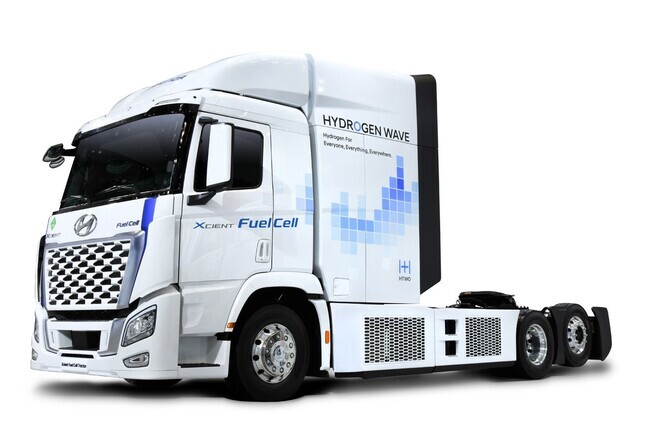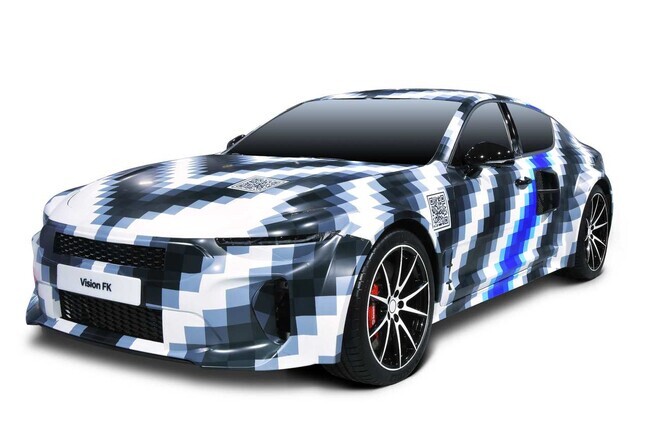hankyoreh
Links to other country sites 다른 나라 사이트 링크
Hyundai Motor to offer hydrogen fuel cell versions of all commercial vehicles by 2028

Hyundai Motor Group Chairman Chung Eui-sun said hydrogen is “one of the most powerful and pragmatic solutions for overcoming environmental challenges” during a virtual “Hydrogen Wave” forum held by the group on Tuesday.
He also said the company plans to make 2040 “year one” for the popularization of hydrogen energy.
Around the world, a contest is shaping up among automobile manufacturers, with a battery electric vehicle (BEV) camp consisting of companies like US-based Tesla facing off against a hydrogen fuel cell vehicle (FCEV) camp.
The biggest players in the eco-friendly FCEV camp are South Korea’s Hyundai Motor and Japan’s Toyota Motor Corporation.
Recently, the BEV camp has been gaining ground with increased sales of vehicles using Tesla Model 3 lithium-ion batteries. Now the Hyundai Motor Group is challenging hydrogen skeptics by spotlighting its new models and the cost-cutting technologies it has established to date.
On Tuesday, Chung said that going forward, all new commercial vehicles, such as buses and heavy-duty trucks, will be sold only as FCEVs and BEVs to hasten the arrival of what he called a “hydrogen society.”
He also said that “by 2028 we plan to become the first global automaker to apply a fuel cell system to all commercial vehicle models.”
A BEV makes use of chemical reactions involving the metal lithium. The battery is charged when plugged into a charger, producing electricity as the vehicle moves.
In contrast, an FCEV produces electricity as hydrogen is introduced to the vehicle, at which point a fuel cell that serves like an internal generator combines oxygen and hydrogen from the air.
Both are similar in that they do not rely on fossil fuels to operate their engine, which means that they do not emit carbon dioxide. Despite their steep price tag, hydrogen vehicles are seen as holding an advantage, with long driving distances per charge and a short sub-10-minute charging time.
The reason Hyundai Motor has focused its attention on commercial vehicles rather than cars is because of the advantages of applying hydrogen technology to trucks and other vehicles that carry large loads.
Large and heavy batteries negatively affect the mileage of large trucks, which have to travel long distances, and reduce the space available for freight.
Having exported the Xcient to Switzerland last year as its first hydrogen-based truck, Hyundai Motor plans to put Xcient trucks on the domestic market during the first half of 2022.
It also announced plans to drastically reduce the price of FCEVs by 2023 through mass production of “half-price fuel cell systems.” The group maintains that it can slash prices to the level of BEVs by around 2030.

Also presented were high-performance hydrogen sports cars; relief vehicles capable of carrying fuel cells and chargers for emergency supplies of electricity to disaster areas and BEVs; and “trailer drones” capable of transporting heavy containers without drivers through the use of autonomous vehicle technology.
The high-performance FCEV dubbed the Vision FK is being co-developed with Rimac Automobili, a Croatian high-performance EV company Hyundai Motor Group has invested in. The vehicle can reportedly accelerate from zero to 100 kph (62 mph) in less than four seconds.
The Hyundai Motor Group’s decision to organize a separate event focused on promoting hydrogen energy appeared to be an attempt to counter market skepticism about hydrogen technology’s commercialization potential and solicit cooperation.
The popularization of hydrogen-based vehicles and hydrogen energy technology remains a long way off.
During the first half of 2021, fewer than 10,000 FCEVs were sold on the global market. The Nexo, a FCEV that Hyundai first began mass-producing in 2018, sold just over 5,000 units between January and June. Low sales can be attributed to a lack of hydrogen charging stations and other infrastructure.
But South Korean corporations and the governments of Germany, China and other countries have been throwing their support behind the FCEV camp.

Joining Chung among the prospective members of a hydrogen corporation council to be launched in South Korea this month are SK Group Chairman Chey Tae-won, POSCO Group Chairman Choi Jeong-woo, and Hyosung Group Chairman Cho Hyun-joon. The companies are actively pursuing new projects as part of a network including hydrogen production, storage and supply.
Chung Eui-sun said that global infrastructure, and the building of hydrogen charging stations in particular, will be crucial for achieving a hydrogen society.
He called for cooperation between private and public sectors to build the necessary infrastructure.
By Park Jong-o, staff reporter
Please direct questions or comments to [english@hani.co.kr]

Editorial・opinion
![[Column] Season 2 of special prosecutor probe may be coming to Korea soon [Column] Season 2 of special prosecutor probe may be coming to Korea soon](https://flexible.img.hani.co.kr/flexible/normal/500/300/imgdb/original/2024/0426/3317141030699447.jpg) [Column] Season 2 of special prosecutor probe may be coming to Korea soon
[Column] Season 2 of special prosecutor probe may be coming to Korea soon![[Column] Park Geun-hye déjà vu in Yoon Suk-yeol [Column] Park Geun-hye déjà vu in Yoon Suk-yeol](https://flexible.img.hani.co.kr/flexible/normal/500/300/imgdb/original/2024/0424/651713945113788.jpg) [Column] Park Geun-hye déjà vu in Yoon Suk-yeol
[Column] Park Geun-hye déjà vu in Yoon Suk-yeol- [Editorial] New weight of N. Korea’s nuclear threats makes dialogue all the more urgent
- [Guest essay] The real reason Korea’s new right wants to dub Rhee a founding father
- [Column] ‘Choson’: Is it time we start referring to N. Korea in its own terms?
- [Editorial] Japan’s rewriting of history with Korea has gone too far
- [Column] The president’s questionable capacity for dialogue
- [Column] Are chaebol firms just pizza pies for families to divvy up as they please?
- [Column] Has Korea, too, crossed the Rubicon on China?
- [Correspondent’s column] In Japan’s alliance with US, echoes of its past alliances with UK
Most viewed articles
- 1After election rout, Yoon’s left with 3 choices for dealing with the opposition
- 2AI is catching up with humans at a ‘shocking’ rate
- 3Noting shared ‘values,’ Korea hints at passport-free travel with Japan
- 4Two factors that’ll decide if Korea’s economy keeps on its upward trend
- 5Why Kim Jong-un is scrapping the term ‘Day of the Sun’ and toning down fanfare for predecessors
- 6South Korea officially an aged society just 17 years after becoming aging society
- 7Korea’s 1.3% growth in Q1 signals ‘textbook’ return to growth, says government
- 8Is Japan about to snatch control of Line messenger from Korea’s Naver?
- 91 in 5 unwed Korean women want child-free life, study shows
- 10[Reportage] On US campuses, student risk arrest as they call for divestment from Israel